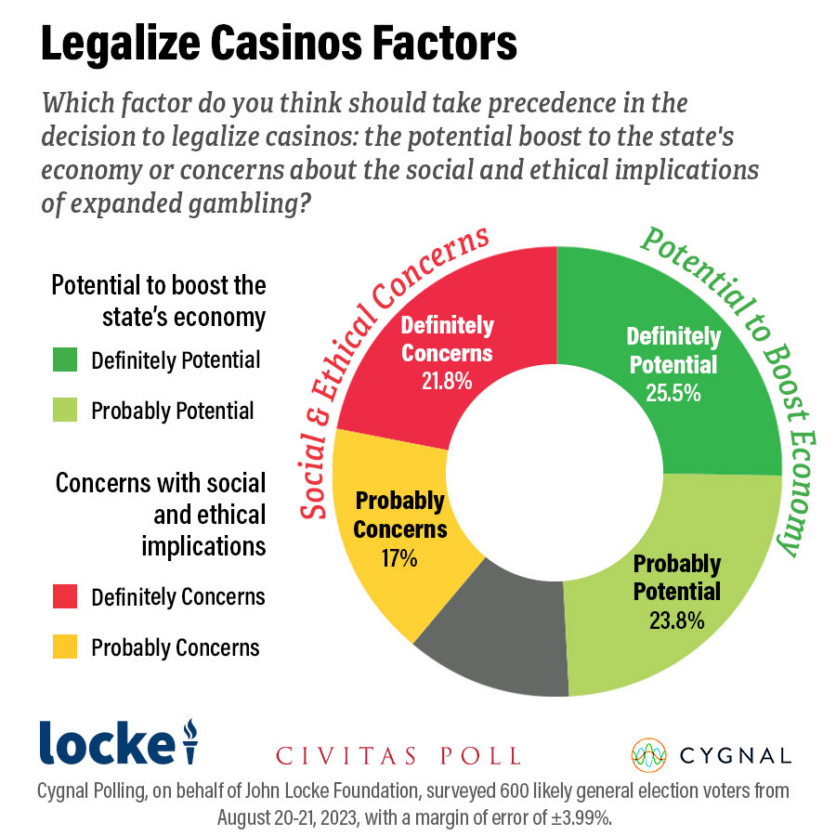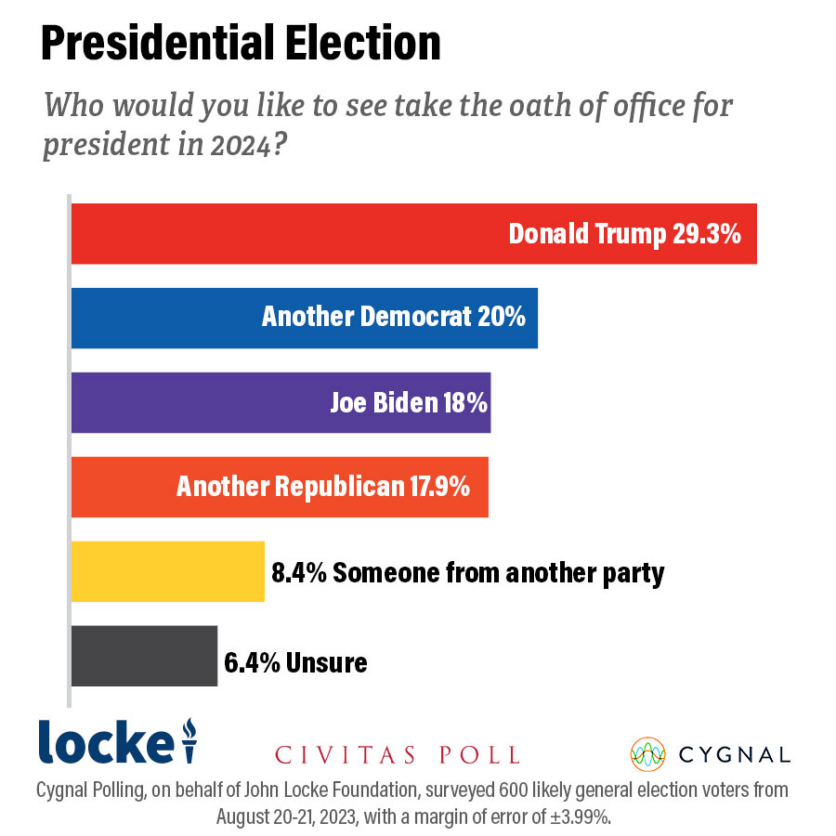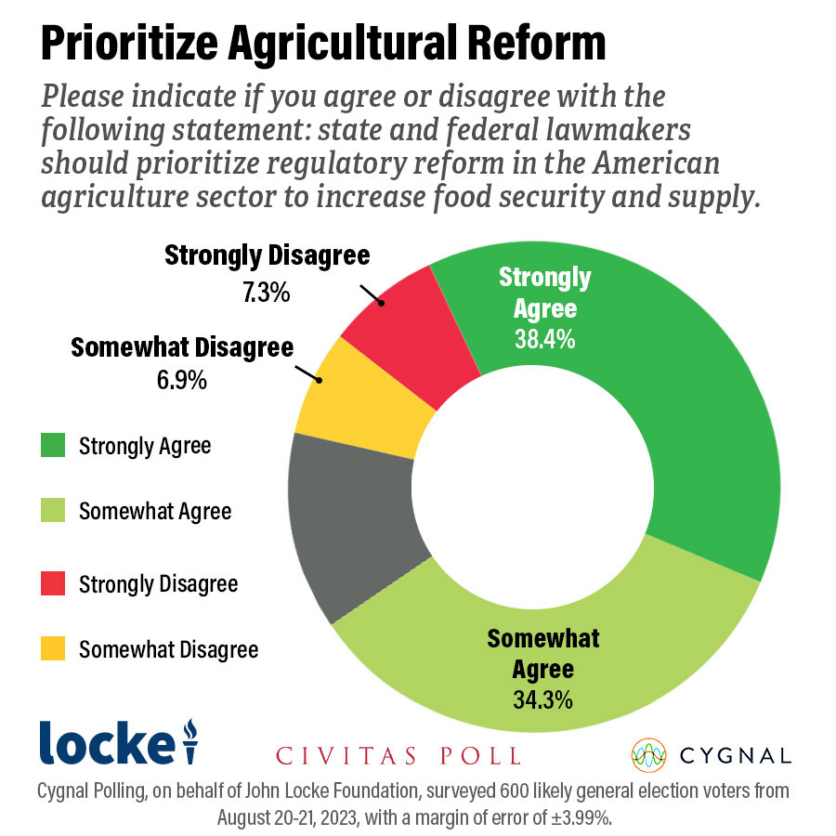August 24, 2023
RALEIGH – A little less than half of likely North Carolina voters (46.3%) would prefer to see someone other than current president Joe Biden or former president Donald Trump in the White House in 2024, according to the results of the John Locke Foundation’s August Civitas Poll.
The news was especially bad for Biden. Just 18% of voters said they would like to see the incumbent Democrat take the presidential oath for a second term. That number was smaller than the 20% who said they would like to see a different Democrat as the next president. Approximately 29% of voters said they would like to see Trump return to the White House, 18% preferred another Republican to take the oath of office in 2024, and 8% wanted to see “someone from another party.”
“I would be concerned about running Biden for president again if I were the Democratic Party,” said Locke CEO Donald Bryson. “It is certainly abnormal to see support for an incumbent president so low, and a 58% job disapproval.”
While Trump appears to have a more dedicated following than Biden, most North Carolinians disapprove of his actions concerning his attempt to overturn election results. Nearly half (47.3%) of voters are convinced the former president did something illegal, and 11.9% believe what he did was wrong but not illegal. Slightly over a third (34.3%) of voters believe Trump did nothing seriously wrong.
Despite most North Carolinians agreeing that Trump did something wrong; however, most voters (54%) also believe the Department of Justice investigation is, nevertheless, motivated by partisan politics. Rural voters were more than twice as likely to say the DOJ investigation is partisan than urban voters.
President Biden’s approval ratings have remained steadily low at 35.4%. While Gov. Roy Cooper’s ratings are still higher than the president’s, they have taken a relative downturn to 40.8% – his lowest approval rating in over two years. Cooper’s ratings are now underwater, with more North Carolinians (44.8%) expressing disapproval than approval.
With the governor’s mansion up for grabs next year, we polled the support and name recognition of candidates competing for his office. The clear front runners were Lt. Gov Mark Robinson and Attorney General Josh Stein. Robinson and Stein had respective favorability ratings of 26.5% and 19.9%, and a narrow majority of voters recognized their names. On the contrary, most North Carolinians said they had never heard of Former Congressman Mark Walker, State Treasurer Dale Folwell, Former NC Senator Andy Wells, or retired health plan CEO Jesse Thomas.
“Even though candidates such as Mark Walker and Dale Folwell have run for – and won – statewide offices, many North Carolinians claim to have not heard of them,” Bryson stated. “With primaries in March, these candidates will have to prioritize mass media as much as possible if they want a shot at the governor’s mansion. Grassroots wins elections, but people need to hear about you first.”
More than three-fourths of NC voters want to vote in a referendum on legalizing casinos. A majority of voters said they would support the legalization of casinos and gambling (54.6%), a 22.5-point lead ahead of those who say they would oppose (32.1%). Support for casinos is highest among men aged 18-34, whereas women in the same age group have the highest levels of opposition. While most voters acknowledge casinos would likely bring in more tax revenue for the state, they are squarely divided on the social implications of casinos. When asked about the social consequences, 45.8% of respondents said they were “very” or “somewhat” worried, compared to 46.8% who said they were “not very” or “not at all” worried.
One matter that most North Carolinians are likely worried about, however, is the increasing prices at the grocery store. Over 95% of respondents said they have noticed increasing food costs. Nearly three-fourths of voters believe the government is doing a poor job at addressing issues related to American agriculture and food security and 65.7% believe the government is actively contributing to these problems through its policies and regulations. When asked to identify the top contributing factors to food costs, 61.1% of people said increasing fuel and energy costs, followed by government policies (43.9%), supply chain issues (36.3%), and global economic conditions (31.8%).


